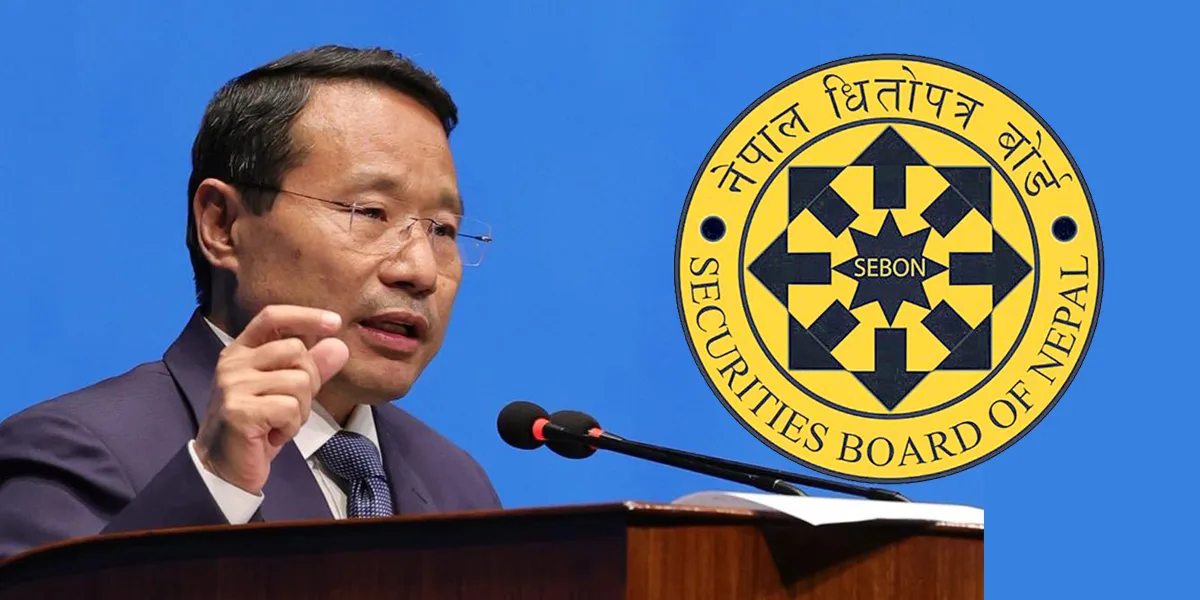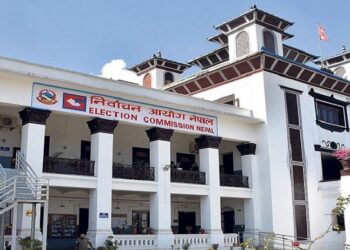KATHMANDU: The position for the post of Securities Board of Nepal (SEBON) chairman has remained vacant for six months, sparking widespread concern over political interference and vested interests dictating regulatory appointments.
Current Finance Minister Barsaman Pun has emerged as a pivotal figure in attempts to influence SEBON, with accusations swirling that various factions seek to install their preferred candidates to serve their own agendas within the capital market regulatory body.
The controversy has particularly embroiled Chairman of CPN-UML KP Oli, who stands accused of maneuvering appointments to favor specific business interests.
Sources within the ministry suggest that amidst a power struggle with Oli, Pun is actively exerting pressure to finalize the chairman’s appointment.
The Ministry of Finance appears to be delaying the appointment process, potentially aiming to restructure or annul it altogether in pursuit of suitable candidates aligned with their interests.
“The ongoing standoff, including the recent boycott of final interviews by shortlisted candidates, underscores the highly politicized and commercialized nature of the process,” a ministry source disclosed.
“It appears certain interest groups have exerted influence, attempting to secure appointments that serve their agendas.”
Under a newly devised procedure by the recommendation committee, controversies have arisen regarding the participation of candidates in crucial interview stages.
Critics allege that the Finance Minister has contested the involvement of three candidates in the final interview and presentation phases, citing potential manipulation of the selection process.
The prolonged vacancy of the SEBON chairman role and the ensuing political maneuvering have raised concerns about transparency and impartiality within Nepal’s financial regulatory framework, highlighting deep-seated tensions between political actors and business entities vying for control over the capital market.
The appointment saga of the SEBON chairman continues to unfold amidst allegations of political interference and personal affiliations affecting the selection process.
Last Sunday, only Santosh Narayan Shrestha and Mukti Shrestha, both on the shortlist, attended the interview convened by the recommendation committee.
The prolonged delay in appointing a chairman to Nepal’s Securities Board, a critical regulatory body overseeing trillions of rupees in the stock market sector, has sparked widespread concern and criticism.
In a subsequent meeting on Wednesday, former Chairman of the Bima Samitee Chiranjeevi Chapagai, Nepal Stock Exchange (NEPSE) CEO Krishna Bahadur Karki, and Board Executive Director Navraj Adhikari were again summoned by the committee for an interview and presentation of their action plans, but they did not participate.
Reports indicate that those who abstained from the interview are perceived to have affiliations with the Maoist Center politically and personal ties with Finance Minister Pun.
Chapagai, notably appointed as the Nepal Insurance Authority chairman during the Maoist-led government, and Karki, who currently serves as NEPSE CEO, have drawn scrutiny due to their connections.
The involvement of business interests has also come under scrutiny, with significant attention from UML Chairman Oli, a prominent coalition partner.
Observers familiar with the chairman appointment process fear that political maneuvering could adversely impact forthcoming activities such as new stock exchange licenses and initial public offerings (IPOs).
Critics allege that Oli’s influence, bolstered by support from the coalition and the Prime Minister’s office, pressured Finance Minister Pun to stall the process, thereby affecting the participation of the three shortlisted candidates in the interview.
However, opposition groups argue that halting the process contradicts the Securities Board Act and the recommendations outlined by the committee.
Section 7(4) of the amended securities law stipulates that the recommendation committee must propose at least three qualified candidates, and grants flexibility in determining procedural recommendations for selecting the board chairman.
Following the non-participation of the three candidates, the recommendation committee informally consulted with the Ministry of Law and the Attorney General’s Office on Wednesday to discuss further steps.
The Ministry of Law advised against halting the chairman appointment process, suggesting that non-participating candidates could still be considered for subsequent stages.
Speaking to Khabarhub, Nepal criticized the government’s inconsistency in appointing qualified experts to regulatory positions, highlighting the detrimental impact on governance within critical sectors.
As of now, the committee awaits formal guidance from the Attorney General’s office, amidst speculation that Finance Minister Pun, through Finance Secretary Madhu Marasini, has sought to delay the appointment process in compliance with legal norms and regulations.
Government incompetence criticized over delayed SEBON Chairman appointment
The prolonged delay in appointing a chairman to Nepal’s Securities Board, a critical regulatory body overseeing trillions of rupees in the stock market sector, has sparked widespread concern and criticism.
Economic experts have lambasted the government, calling its handling of the leadership selection process incompetent and insensitive.
Former Finance Minister and economist Dr. Yuvraj Khatiwada has squarely blamed the government for the six-month vacancy at the Securities Board, labeling it a clear sign of incompetence.
“The government could appoint a Securities Board Chairman within a week, and even if delayed, it should not take more than 15 days to a month,” remarked Dr. Khatiwada, stressing the importance of merit-based appointments and timely completion of processes.
Dr. Khatiwada further emphasized the need for decision-makers to prioritize merit over personal agendas in appointing officials, asserting that delays due to vested interests only exacerbate issues.
Former Board Chairman and ex-governor Chiranjeevi Nepal also expressed dismay over the prolonged vacancy in the stock market regulatory body.
Speaking to Khabarhub, Nepal criticized the government’s inconsistency in appointing qualified experts to regulatory positions, highlighting the detrimental impact on governance within critical sectors.
“Parties are looking out for their own interests while the government neglects the 45 trillion market, all the while talking about prosperity,” he remarked.
“They attempt to govern with ease, akin to America’s spoil system where ministers are frequently replaced. However, when it comes to appointing experts in regulatory bodies, especially those overseeing critical sectors, challenges arise.”









Comment